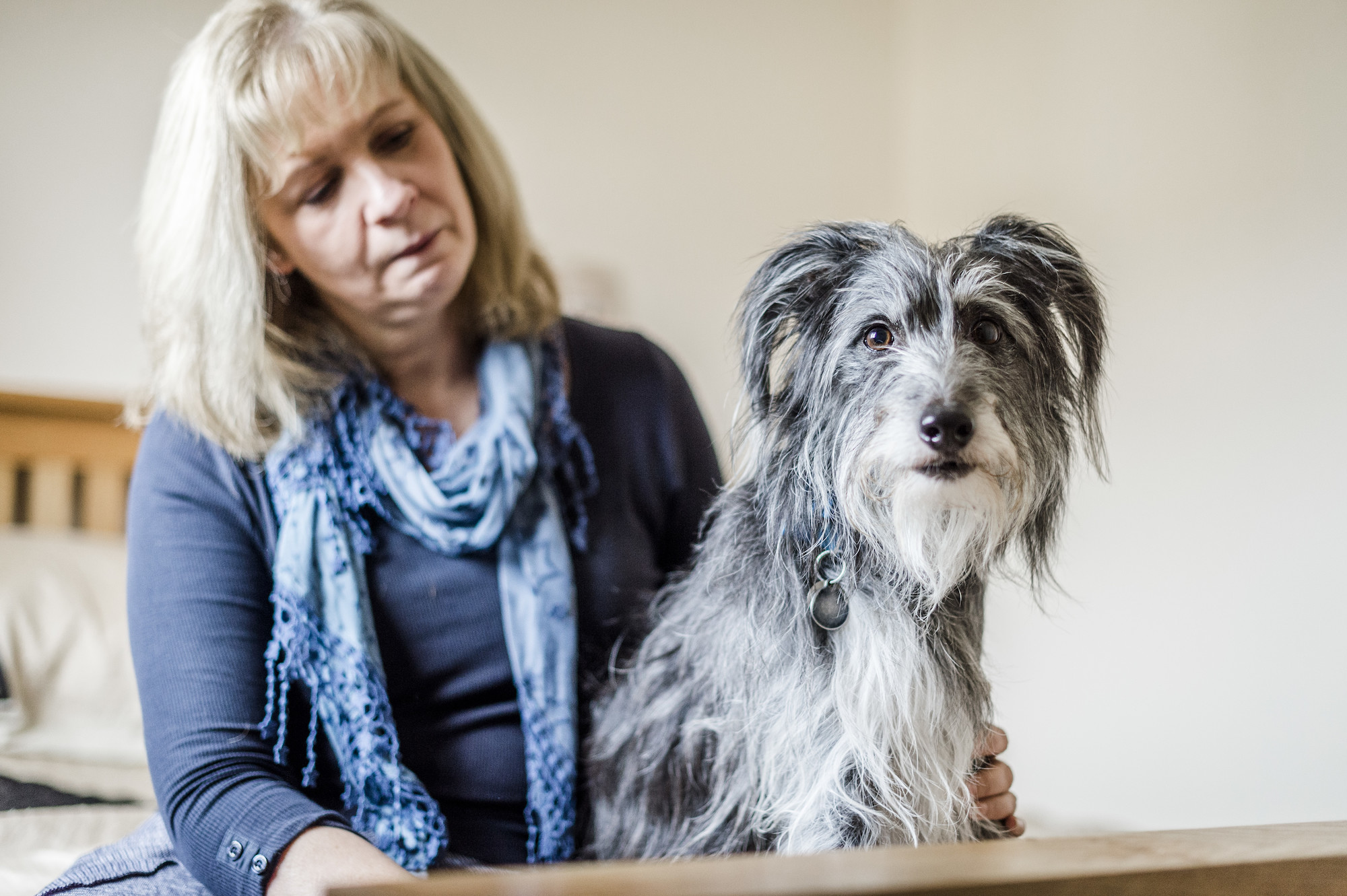
Saying goodbye to your dog
Sadly, dogs have much shorter lives than us. When illness, injury or old age causes untreatable pain that affects their quality of life, we need to start thinking about saying goodbye to them.
Euthanasia, or putting your dog to sleep, is sometimes the only way to ease a pet's pain and suffering. It is a heart-breaking decision for any dog's family, but one that most have to face in order to give their much-loved pet a peaceful death. Sadly, it's very rare for a dog to die peacefully in their sleep at home.
Signs of poor quality of life in dogs
Dogs can often hide or cope with discomfort, but common signs that your pet is in pain and may no longer have a good quality of life can include:
- being withdrawn or quiet
- restlessness, unable to get comfortable or lying in odd positions
- avoiding physical contact
- excessive panting or shaking
- crying or yelping
- difficulty breathing
- disorientation or confusion
- loss of enthusiasm for walks
- not eating or drinking
- regular or persistent vomiting
- change in toilet habits or incontinence (weeing or messing on the floor where they wouldn't usually)
Important
If your dog is showing any of these signs or you are worried about their wellbeing, speak to your vet as soon as possible. Signs of old age, like arthritis, can be relieved, so your dog may have a good quality of life for many more years with treatment.
However, there may come a time when your vet can no longer keep your dog comfortable with medications or management suggestions. When this happens, or if a condition comes on suddenly, then you may have to think about putting your dog to sleep.
When is the right time to say goodbye to my dog?
It's often difficult to know how your dog is really feeling, so it's important to talk with your vet, family and friends. That way you can ensure you make a decision based on your dog's best interests.
You and your family know your dog better than anyone else and, often, it's a case of them having more bad days than good. If medication is prescribed to tackle pain, it's sensible to set a time limit with your vet for improvements to your pet's quality of life. If treatment isn't enough to prevent further suffering, your vet is likely to recommend euthanasia.
We often feel guilty about whether we put our pets to sleep too soon, or too late, but these are normal reactions when we grieve and you're not alone in those feelings. Remember that few dogs die peacefully in their sleep at home. Most reach a point when their quality of life is poor and a decision for euthanasia has to be made.
What if my pet dies suddenly?
In life we don't always know what is around the corner, and a sudden or unexpected loss, can leave us feeling shocked and struggling to cope. Our trained professionals are here to help you through.
How should I prepare for my dog being put to sleep?
Once you've made the decision, it can take its toll emotionally. To help you through what can be a difficult time you may want to consider:
- taking some time off work to process what's happened
- explaining the situation to the vet receptionist when you make the appointment – you can often choose a quiet time for your visit to the surgery
- taking a friend or family member with you for support
- asking for a house visit or at home euthanasia service – some vets will agree to this if you prefer or may provide details of a special vet who can do this
Where will euthanasia take place?
Putting a dog to sleep is a medical procedure and will usually take place at a vet surgery at an arranged time. It may be possible for your vet to come to your home, but this varies from vet to vet.
Sometimes, your dog will already be hospitalised or under anaesthetic. If your dog is already under anaesthetic, though this may be hard, it may be kinder to agree to euthanasia without waking them up so they are not in pain. Your vet will be able to help guide you through this decision.
What happens during euthanasia?
Some of the events described below may be hard to read, but remember that your dog quickly loses consciousness and cannot feel pain from that point onwards.
Before your dog is put to sleep, your vet will usually make you sign a consent form. Once this is done, they will begin the process.
- Euthanasia is usually carried out by injecting an overdose of anaesthetic into the vein of the front leg, although the injection can be given to other areas of the body as well
- Your dog will be held by a nurse and a small patch of fur is shaved off. All your dog feels is a tiny prick of the needle – the injection is painless
- They may give a small cry as the injection is given – as with all anaesthetics, there is a brief feeling of dizziness as the drug takes effect
- Unconsciousness follows within seconds, often before the injection is finished
- Death occurs very quickly when the heart stops beating. It may take a little longer if your pet is very ill or has poor circulation.
- In the few minutes after your dog has passed you may see twitching, or hear gasps of air. These are not signs of life; they are reflexes that naturally occur when a dog passes away
- The eyes usually stay open and the bladder sometimes empties
Should I stay with my dog during euthanasia?
This is entirely your choice, but we often hear that it is comforting for owners to know that they were with their pet at the end. Your dog might also find it comforting to have you with them.
Try not to feel guilty if you feel unable to watch – if you are upset or panicking then this may upset your dog. Your vet and vet nurse will do everything they can to look after and comfort your dog as they pass away and you can see your dog afterwards, to say goodbye.
What happens after euthanasia?
After your dog has passed away, you'll be asked what you would like to do with their body. You can often choose:
- cremation – usually, this is communal cremation with other dogs, but you can arrange for individual ashes to be returned, although this may be more expensive
- burial – there are pet cemeteries which vets usually have details on or you can take their body home to bury them. Though be sure to speak with your vet as there are some rules that you will need to know about where you are legally allowed to bury them.
If you are undecided, then vets can usually store the body while you consider your options. Cremation can also be expensive. Some pet insurance plans can cover cremation. Or you may want to speak to your vet if you're worried about costs.
What can I do to remember my pet?
There are lots of things you can do to help remember your pet. You could:
- ask the vet if you can keep a lock of hair – don't be embarrassed, vets actually get this one quite a lot
- ask for a paw print from the pet crematorium or your vet
- perform a ceremony, like a funeral, with all those who loved your dog
- create a pet memorial
- make a scrapbook of memories
- set up a little shrine in the corner of a room with a photo of them, their collar and a candle
- write a goodbye letter and bury it with them
- write a poem or short story talking about your life with them
- share your loss with others who have been through it
- become a volunteer and help others through their pet loss
Is it normal to feel upset?
Our dogs are trusted companions and beloved members of the family, so it's completely natural to feel upset. When you arrive back home, your house might feel emptier than usual. It'll be hard at first but take each day as it comes, try to treasure your memories and talk to family and friends about it.
Try not to feel embarrassed about showing your emotions – vets expect you to be upset. It takes time to get over the loss of a loved one, and, although reactions differ, you will often feel a mixture of things, such as:
- sadness
- loneliness
- anger
- guilt
- doubt
Though it's natural, try not to feel guilty or blame yourself – the decision for euthanasia is taken with your dog's best interests at heart to avoid them suffering.
How can I support my children through pet loss?
For children it can be especially upsetting as it may be their first experience of death. Children need support even if they are not outwardly upset. Talk to them honestly about what is happening and, as far as possible, involve them in the decision making.
More on children and pet loss.
Will my other pets feel loss?
Like us, pets also show signs that could be interpreted as grief when an owner or fellow pet passes away. Behaviours can vary, but may include crying, searching for their friend or loss of appetite.
Read up on how pets cope with loss.
Should I get another dog?
Getting another dog after you've had to say goodbye will depend on your circumstances and how ready you feel.
If you do choose to get another pet, it's worth thinking about whether you'll have the time to dedicate to them. This might be more difficult if you're still grieving, but many people also tell us a new family member helps them to move on and process their grief. While you will never forget your pet, a new dog can bring joy and laughter back into your home.
If you feel you would like to get another dog, you can always consider adopting from one of our rehoming centres.
How we can help
Sometimes it helps to share your feelings with someone who knows from personal experience how distressing the loss of a dog can be, and who will listen with compassion and without judgement.
Pet Loss Support offers support to grieving pet owners, through a national network of trained volunteers. We're here seven days a week via phone, email and webchat.
Telephone: 0800 096 6606 (seven days a week 8.30am – 8.30pm)
Email: [email protected]
We also have a Facebook group if you'd like to join a community of people supporting each other through their grief.
Page details
Reviewed
• 23 February 2023
Next review
• 23 February 2026



